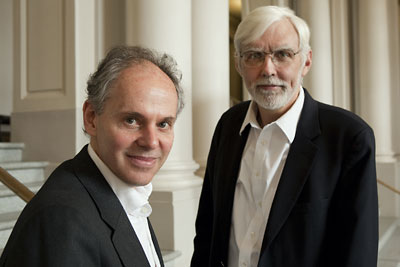Deans articulate their commitment to the arts
By G. Peter Lepage

"In tough times, the arts become expendable." People say it, with exasperation or sadness, when National Endowment for the Arts funding is debated, when government support for community galleries and orchestras is cut, when public school arts programs shrink. The sentiment increasingly goes unchallenged in this country.
But the arts are not optional for us; they are fundamental to Cornell University's academic mission. While arts-focused departments and programs undergo the same close scrutiny, reorganization and budget reductions as the university's other units, we want to reaffirm that the arts are not supplemental to a modern research institution. The creative and performing arts are core activities, forms of knowledge production, and modes of exploring the human condition. They are currently the focus of intense and stimulating discussion -- and not just related to budget -- precisely because they play a key role in our university, even as Cornell adjusts to its new budget and especially as it plans for the future.
The arts face extraordinary challenges to traditional assumptions regarding artistic work, and we at Cornell are compelled and prepared to engage these challenges. What is the status of authorship in a world of networked creation and production? In an era in which the climate itself is debated as a designed condition, is there actually a boundary that separates human artifice from the natural? Is visual literacy an increasingly essential precondition for informed citizenry? Are well-educated individuals still assumed to have more than a casual knowledge of music, literature, drama and art? Such questions are not, of course, only about painting, writing, composing or designing; these are questions about this moment in the evolution of what it means to be human.
Just as the arts are a core academic function, they also serve the university's mission to disseminate knowledge. Cornell invites the public to engage with the arts through exhibitions, installations, performances, readings, publications, screenings and more. The campus and regional communities have extraordinary opportunities, such as experiencing Salman Rushdie discuss his fiction and Mary Ellen Mark describe her photographs. During any semester, audiences are the first to experience new works in music, dance, theater and film. Moreover, our communities gain an even richer understanding when pre-eminent artists and scholars of the arts -- many of them members of Cornell's faculty -- share their insights during lectures, symposia and informal discussions.
Creative scholarship and practice are not limited to the College of Architecture, Art and Planning and the College of Arts and Sciences. Now more than before, efforts are under way to form bridges between all of Cornell's colleges and schools to enhance teaching and learning opportunities. Such connections will add a rich layer to the unusually full range of informal arts activities already taking place across the campus.
Despite today's financial constraints, the university continues to raise dedicated funds and devote other resources to support its arts faculty and programs. The addition to the Herbert F. Johnson Museum of Art and the construction of Paul Milstein Hall are under way, and the humanities building will follow when funding allows.
Cornell will not turn away from its longstanding goal of investing in the arts because their strength is essential to our university's mission and identity.
Kent Kleinman is the Gale and Ira Drukier Dean of the College of Architecture, Art and Planning; G. Peter Lepage is the Harold Tanner Dean of the College of Arts and Sciences.
Media Contact
Get Cornell news delivered right to your inbox.
Subscribe